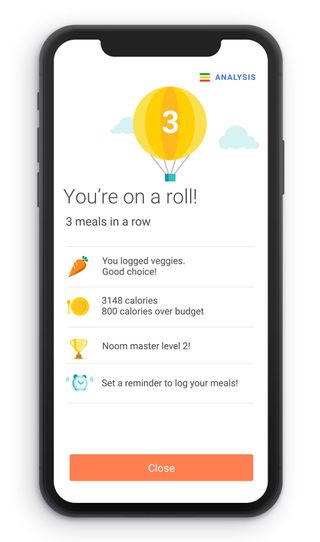Here’s How Noom Can Help You Establish Healthy Habits
Techniques like temptation bundling can help you make a change for the better

There are lots of programmes that offer to help you develop a healthier lifestyle. One of the most successful, and something of a phenomenon Stateside, is Noom, which has a reported 45 million users. Noom harnesses the power of psychology and includes a series of short, easy-to-digest lessons to help you understand how your mind works and how new habits can be formed, supported by tracking tools and a real-life specialist through the app.
We think establishing healthy habits is a great idea and anything that helps you do that is worth a try. To get a better understanding of the science that underpins the app, we spoke to Noom’s chief of psychology, Dr Andreas Michaelides, and among other things learned how something called temptation bundling can help solidify a new habit you’re struggling with. So here’s everything you need to know about Noom – and if you’re intrigued, a 14-day trial costs just a quid.
How important is psychology to Noom’s service?
Psychology is the foundation of Noom’s educational curriculum and coaching model. Rather than focusing on telling Noomers what to do, Noom supports individuals to develop habits and reach goals that are sustainable for them. Noom’s curriculum is based on cognitive behavioural therapy (CBT) techniques, and helps Noomers create habits by focusing on smaller goals and celebrating success throughout their health journey.
Given all weight-loss and fitness programmes require behaviour change of some sort, what makes Noom’s approach different?
Noom draws upon CBT as an integral part of the educational curriculum. By helping the individual focus on breaking behaviour chains that may have hindered progress in the past, Noom helps individuals dig deeper into the “why” of their habits. Noom coaches also work alongside you and help you craft a path to achieve your “big picture” goals. This allows Noomers to focus on their own habits and develop new ones through daily steps, tasks and goals that encourage self-awareness, careful consideration and gentle nudges to stay on track.
What sort of psychological change is Noom looking to help users achieve?
This depends on the individual and their goals. Our coaching team helps Noomers recognise common thought distortions (“If I eat one delicious cupcake, my entire day is ruined” or “Other diets haven’t worked for me, so I’m bound to fail at my new Noom programme”) as a basis for changing and developing habits. Evaluating thoughts and ideas like this can be challenging, and at times uncomfortable, but is an important part of CBT and Noom’s curriculum.
Is it hard to develop new habits?
Habits are an automation of the decisions we make over time. Every day, we are tasked with making hundreds of decisions, from what to make for breakfast to when to get in bed, and if every single decision we made were a conscious effort, our brain would explode. That’s where habits come in. Habits take the decisions we make continually and turn them into an automatic response. There are a lot of things that can influence an automatic response including your environment, stress levels and emotions, even positive emotions. That said, anything that is learned can be unlearned.
One trick we encourage our clients at Noom to try is “temptation bundling”. Conceptualised by Professor Katy Milkman, a behavioural expert at the University of Pennsylvania, temptation bundling is the idea that a new habit becomes easier to stick with if you bundle it with a pre-existing habit. For example, if your goal is to integrate more movement in your day, make a decision that you’ll listen to your favorite podcast only while out on a walk. This gives you gratification while also building the long-term healthy habit.

Does Noom take advantage of the gamification and “small rewards” design that help make some smartphone apps compelling?
We certainly cheer Noomers on as they reach milestones along their journey, both with their goals and consistency along the way! Also, did you know that checking items off a list actually releases dopamine, which is connected to feelings of pleasure, learning and motivation? Achieving small goals, such as weighing in, logging meals and drinking water, is an effective way to stay motivated in the long term and slowly build confidence around larger goals.
At Noom, we believe in walking alongside you to personally support you through life’s obstacles and help you achieve your long-term wellness goals. Change is a human process and connection drives sustainable changes, especially in the realm of self-image where thought distortions often dictate behaviour.
Get the Coach Newsletter
Sign up for workout ideas, training advice, reviews of the latest gear and more.
Coach is a health and fitness title. This byline is used for posting sponsored content, book extracts and the like. It is also used as a placeholder for articles published a long time ago when the original author is unclear. You can find out more about this publication and find the contact details of the editorial team on the About Us page.

